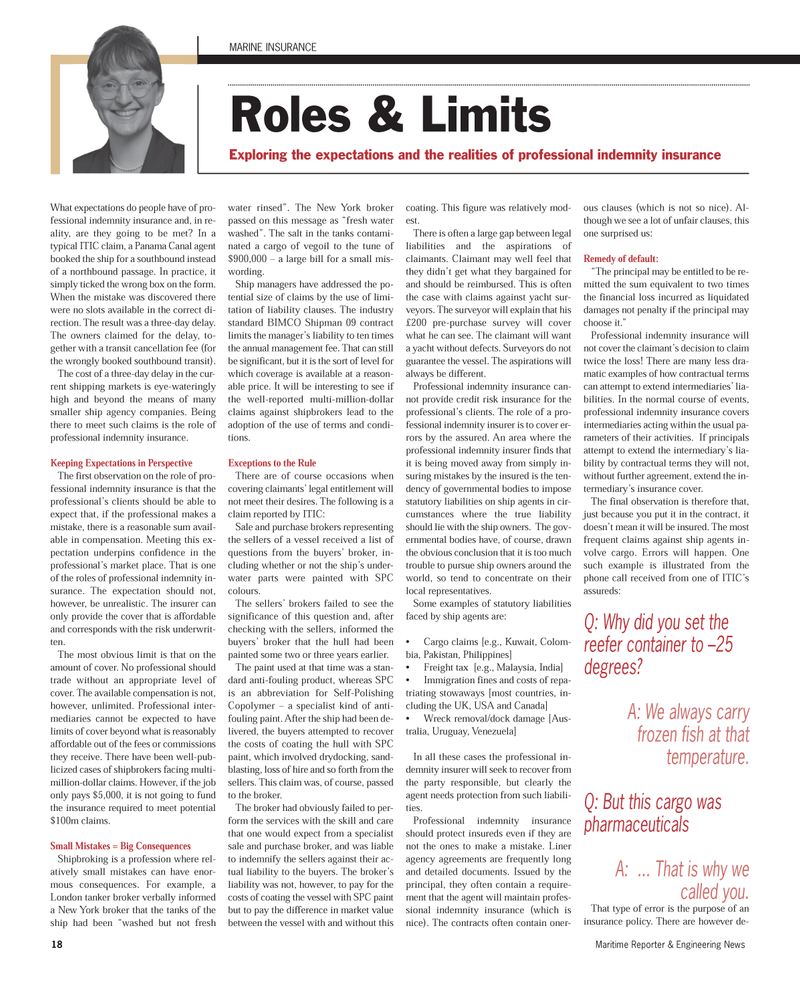
Page 18: of Maritime Reporter Magazine (July 2012)
Arctic Operations
Read this page in Pdf, Flash or Html5 edition of July 2012 Maritime Reporter Magazine
18Maritime Reporter & Engineering News What expectations do people have of pro- fessional indemnity insurance and, in re-ality, are they going to be met? In a typical ITIC claim, a Panama Canal agent booked the ship for a southbound instead of a northbound passage. In practice, itsimply ticked the wrong box on the form. When the mistake was discovered there were no slots available in the correct di- rection. The result was a three-day delay. The owners claimed for the delay, to- gether with a transit cancellation fee (forthe wrongly booked southbound transit). The cost of a three-day delay in the cur- rent shipping markets is eye-wateringly high and beyond the means of many smaller ship agency companies. Being there to meet such claims is the role ofprofessional indemnity insurance. Keeping Expectations in Perspective The first observation on the role of pro- fessional indemnity insurance is that theprofessional?s clients should be able to expect that, if the professional makes a mistake, there is a reasonable sum avail- able in compensation. Meeting this ex- pectation underpins confidence in the professional?s market place. That is one of the roles of professional indemnity in-surance. The expectation should not, however, be unrealistic. The insurer can only provide the cover that is affordable and corresponds with the risk underwrit- ten.The most obvious limit is that on the amount of cover. No professional should trade without an appropriate level of cover. The available compensation is not, however, unlimited. Professional inter- mediaries cannot be expected to have limits of cover beyond what is reasonably affordable out of the fees or commissions they receive. There have been well-pub- licized cases of shipbrokers facing multi- million-dollar claims. However, if the job only pays $5,000, it is not going to fundthe insurance required to meet potential$100m claims.Small Mistakes = Big Consequences Shipbroking is a profession where rel-atively small mistakes can have enor- mous consequences. For example, a London tanker broker verbally informed a New York broker that the tanks of the ship had been ?washed but not fresh water rinsed?. The New York broker passed on this message as ?fresh water washed?. The salt in the tanks contami- nated a cargo of vegoil to the tune of $900,000 ? a large bill for a small mis- wording. Ship managers have addressed the po- tential size of claims by the use of limi-tation of liability clauses. The industry standard BIMCO Shipman 09 contractlimits the manager?s liability to ten times the annual management fee. That can still be significant, but it is the sort of level for which coverage is available at a reason- able price. It will be interesting to see ifthe well-reported multi-million-dollarclaims against shipbrokers lead to the adoption of the use of terms and condi-tions.Exceptions to the RuleThere are of course occasions whencovering claimants? legal entitlement will not meet their desires. The following is a claim reported by ITIC:Sale and purchase brokers representing the sellers of a vessel received a list of questions from the buyers? broker, in- cluding whether or not the ship?s under- water parts were painted with SPC colours.The sellers? brokers failed to see the significance of this question and, after checking with the sellers, informed thebuyers? broker that the hull had been painted some two or three years earlier. The paint used at that time was a stan- dard anti-fouling product, whereas SPCis an abbreviation for Self-Polishing Copolymer ? a specialist kind of anti-fouling paint. After the ship had been de- livered, the buyers attempted to recover the costs of coating the hull with SPCpaint, which involved drydocking, sand- blasting, loss of hire and so forth from thesellers. This claim was, of course, passed to the broker. The broker had obviously failed to per- form the services with the skill and carethat one would expect from a specialist sale and purchase broker, and was liable to indemnify the sellers against their ac- tual liability to the buyers. The broker?s liability was not, however, to pay for the costs of coating the vessel with SPC paint but to pay the difference in market value between the vessel with and without this coating. This figure was relatively mod- est.There is often a large gap between legal liabilities and the aspirations ofclaimants. Claimant may well feel thatthey didn?t get what they bargained for and should be reimbursed. This is often the case with claims against yacht sur- veyors. The surveyor will explain that his £200 pre-purchase survey will cover what he can see. The claimant will want a yacht without defects. Surveyors do not guarantee the vessel. The aspirations will always be different. Professional indemnity insurance can-not provide credit risk insurance for the professional?s clients. The role of a pro- fessional indemnity insurer is to cover er- rors by the assured. An area where the professional indemnity insurer finds that it is being moved away from simply in- suring mistakes by the insured is the ten- dency of governmental bodies to impose statutory liabilities on ship agents in cir- cumstances where the true liabilityshould lie with the ship owners. The gov- ernmental bodies have, of course, drawn the obvious conclusion that it is too much trouble to pursue ship owners around the world, so tend to concentrate on their local representatives. Some examples of statutory liabilities faced by ship agents are: Cargo claims [e.g., Kuwait, Colom- bia, Pakistan, Philippines] Freight tax [e.g., Malaysia, India] Immigration fines and costs of repa- triating stowaways [most countries, in- cluding the UK, USA and Canada] Wreck removal/dock damage [Aus- tralia, Uruguay, Venezuela] In all these cases the professional in-demnity insurer will seek to recover from the party responsible, but clearly the agent needs protection from such liabili-ties.Professional indemnity insuranceshould protect insureds even if they are not the ones to make a mistake. Liner agency agreements are frequently long and detailed documents. Issued by theprincipal, they often contain a require- ment that the agent will maintain profes-sional indemnity insurance (which isnice). The contracts often contain oner- ous clauses (which is not so nice). Al- though we see a lot of unfair clauses, this one surprised us:Remedy of default:?The principal may be entitled to be re-mitted the sum equivalent to two times the financial loss incurred as liquidated damages not penalty if the principal maychoose it.? Professional indemnity insurance willnot cover the claimant?s decision to claim twice the loss! There are many less dra- matic examples of how contractual terms can attempt to extend intermediaries? lia- bilities. In the normal course of events, professional indemnity insurance covers intermediaries acting within the usual pa-rameters of their activities. If principals attempt to extend the intermediary?s lia- bility by contractual terms they will not, without further agreement, extend the in- termediary?s insurance cover. The final observation is therefore that, just because you put it in the contract, itdoesn?t mean it will be insured. The most frequent claims against ship agents in- volve cargo. Errors will happen. One such example is illustrated from the phone call received from one of ITIC?s assureds: Q: Why did you set thereefer container to ?25 degrees? A: We always carry frozen fish at that temperature. Q: But this cargo was pharmaceuticalsA: ... That is why wecalled you.That type of error is the purpose of aninsurance policy. There are however de- MARINE INSURANCERoles & LimitsExploring the expectations and the realities of professional indemnity insurance MR#7 (18-25):MR Template 7/6/2012 10:20 AM Page 18

 17
17

 19
19
